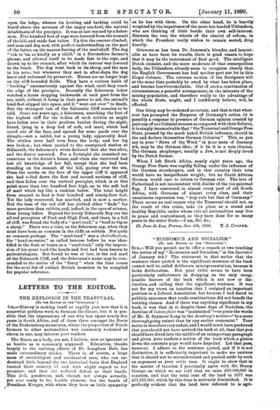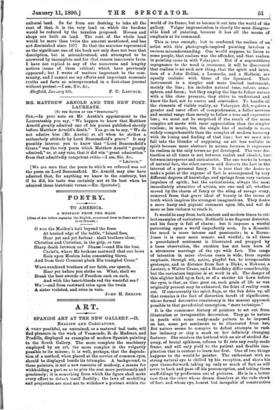"ECONOMICS AND SOCIALISM."
[To TER EDITOR OF THE "SPECTATOR." l you permit me to offer a remark or two toncbing the notice of my " Economics and Socialism," in the Spectator of January 4th ? The statement in that notice that the sentence there quoted is the significant sentence of the book cannot well be called deliberate misrepresentation, because it lacks deliberation. But your critic seems to have been particularly unfortunate in dropping on the only recog- nisable feature of the book which is not new or dis- tinctive, and calling that the significant sentence. It was not for my views on taxation that I resigned an important• position in a Liberal Association, but because I had dared to publicly announce that trade combinations did not benefit the working classes. And if there was anything significant in my book, it was that in it, despite these days of Socialism, the doctrine of laissez faire was "maintained "—to quote the words of Mr. R. Seymour Long in the Academy's notice—" to a more thoroughgoing extent than by any earlier economist." Your notice is therefore very unfair, and I would much have preferred that you should not have noticed the book at all, than that yon should have dived into the middle of an unimportant paragraph and given your readers a notion of the book which a glance down the contents page would have dispelled. Let that pass, however. I adhere to the sentence quoted, and if it is not distinctive, it is sufficiently important to make me anxious that it should not be misunderstood and pushed aside by such an argument as your critic uses. It ought to show that in the matter of taxation I practically agree with Mr. Henry George, on which we are told that we raise £90,000,000 in taxation, and that the total rent of the land in 1877 was £51,811.000, which by this time is seriously diminished. It is perfectly evident that the land here referred to is agri. cultural land. So far from our desiring to take all the rent of that, it is the very land on which the burdens would be reduced by the taxation proposed. Houses and shops are built on land. The rent of the whole land would be more than twice the amount mentioned, and has not diminished since 1877. So that the sentence represented as the significant one of the book not only does not bear that description, but is misunderstood, and attempted to be answered by incomplete and for that reason inaccurate facts. I have not replied to any of the numerous and lengthy notices (some of them critical) which have previously appeared ; but I wrote of matters important to the com- munity, and I cannot see my efforts and important economic truths and facts so misrepresented in a first-class journal without protest.—I am, Sir, &c., Sheffield, January 8th. F. U. LAYCOCE.



































 Previous page
Previous page